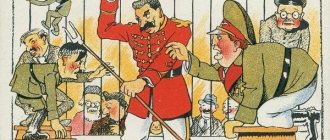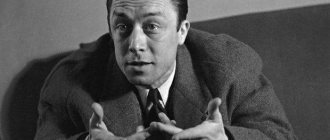It is impossible to say that this work was widely popular, and that quotes from “The Master and Margarita” were widely distributed among the people. Despite the light and beautiful style of presentation, this novel and other works of Bulgakov were perceived by Soviet people as something difficult to understand and unparalleled, alien and even hostile. Now it’s hard to believe it, but many in those days considered Yeshua to be the Gospel Christ, and the chapters from the book about him and Pilate were not based on the biblical story, but its exact retelling. But the novel did not gain universal popularity not only for this reason. To fully perceive it, you need to be able to abstract from standards, and not everyone can do this.
A new round of interest in the writer’s work was caused by a film, or rather a series, by Vladimir Bortko with the same name. Its premiere occurred at a time when the Internet in Russia was already widespread, so phrases from the work became very popular. They are interesting primarily because they reflect a view from an alternative reality, which is associated with the power of Woland, on everyday events and phenomena of the ordinary world. Therefore, quotes about love, even taken out of context, have an impact with their directness and frankness, and those dedicated to people’s lives clearly highlight the most important features and contradictions in it. We can say with confidence that the novel will not lose its value in the future, and the best aphorisms from it will excite generations of new readers and viewers of stage productions and films. It is quite possible that this is exactly what one of the characters meant when he said that manuscripts do not burn. Only paper can burn, but not thoughts and feelings, if they are expressed by a brilliant writer and are able to find responses in the hearts of many fans.
About life
An unhappy person is cruel and callous. And all just because good people mutilated him.
These women are difficult people!
A person without a surprise inside, in his box, is uninteresting.
Understand that the tongue can hide the truth, but the eyes can never! Alarmed by the question, the truth from the bottom of the soul jumps into your eyes for a moment, and it is noticed, and you are caught.
Yes, man is mortal, but that would not be so bad. The bad thing is that he is sometimes suddenly mortal, that's the trick!
Cowardice is one of the most terrible human vices. -No, I dare to object to you. Cowardice is the most terrible human vice
Never be afraid of anything. This is unreasonable.
The most terrible anger is the anger of powerlessness.
Do you agree that only the one who hung it can cut the hair?
Sometimes the best way to destroy a person is to let him choose his own fate.
There are no evil people in the world, there are only unhappy people.
I'll tell you a fairy tale. There was only one aunt in the world. And she had no children and no happiness at all. And so at first she cried for a long time, and then she became angry.
No document, no person.
Sometimes Death comes suddenly
“….Brodsky, who suffered three heart attacks, was warned more than once that smoking was the most terrible enemy of his diseased heart. But he not only continued to smoke, but at the same time he smoked the strongest cigarettes, from which he also broke off the filter. They once told him: “Provided that you stop smoking, Joseph, you are guaranteed another ten years of life.” To which the poet replied: “Life is wonderful precisely because there are no guarantees, never any” (For me, there is nothing wonderful in this for me personally - it’s an excuse for my long-term smoking)
The sudden death of a person who just yesterday was busy with his own affairs - making plans for the future - is actually not such a rare thing.
But again, this is fascinating for the living - how is it - suddenly a person has run out of everything to do - I think the deceased no longer cares. At the same time, there are quite funny cases and instructive cases - for example, I remember the following: one famous businessman - started from practically nothing - finally achieved his goal. And that means he built a sports complex in the city park - for himself - tennis there and the like, a holiday home - a track for jogging, a swimming pool.
And after that - he took it and died - the blood clot came off - the person didn’t drink, didn’t smoke - taking care of your health means. (And he died - suddenly came home with friends - had dinner. He went to his room and died. He also probably packed his briefcase - or I planned things for the next day. But no, it didn’t work out. Also, as far as I remember, it was about 55 years old - no more.)
And now this complex stands as a monument to this businessman.
Moreover, if you look closely at such cases, every middle-aged person can remember five or six when a person’s life was cut short - literally suddenly. And as a rule, this is a heart attack or something with the heart - the fastest and most reliable death for a person - you never know where she will be watching over her victim.
Another interesting story that I read once in a magazine - “Physical Culture and Sports” for some year in the 80s, where a person describes how a heart attack happened to him and how to live after it.
The bottom line is this - this man was a big fan of sports and physical education - accordingly and naturally - he did not drink or smoke. Once I was making a horizontal bar in the yard or some kind of sports corner there - and so I decided to run up to my floor with this horizontal bar for the sake of my health. He ran in and fell - fortunately his wife was nearby - and called an ambulance - a heart attack from prolonged physical fatigue. (It turns out that you need to do physical education moderately - without overworking - observing, so to speak, a “work and rest regime”. So then this person describes for a long time and tediously how he was treated after this sudden heart attack. About physical education and especially about sports exercises there was no more talk.
Although, in my opinion, it’s a completely normal death - “bang and goodbye” and no torment. It could be worse. The only thing those around him will think about for a while is that he should have packed his briefcase the next day, and he took it and died.
About love
Love jumped out in front of us, like a killer jumps out of the ground in an alley, and struck us both at once!
Who told you that there is no true, faithful, eternal love in the world? May the liar's vile tongue be cut out!
She entered the gate once, and before that I experienced at least ten heartbeats...
Which country's wine do you prefer at this time of day?
She carried disgusting, disturbing yellow flowers in her hands. The devil knows what their names are, but for some reason they are the first to appear in Moscow.
I was tormented because it seemed to me that it was necessary to talk to her, and I was worried that I would not utter a single word, and she would leave, and I would never see her again...
She came to me every day, and I started waiting for her in the morning. This expectation was expressed in the fact that I rearranged objects on the table.
Hippo Cat Quotes
I don’t play pranks, I don’t hurt anyone, I fix the primus stove, and I also consider it my duty to warn that the cat is an ancient and inviolable animal.
Yes, I give up, but I give up solely because I can’t play in an atmosphere of bullying from envious people!
History will judge us.
“Why the hell do you need a tie if you’re not wearing pants?” - A cat is not supposed to wear pants.
Everyone decorates themselves as best they can.
Maestro! Shorten the march!
“I almost became hysterical,” the cat added, licking the spoon with caviar.
I’m silent, I’m silent... Consider that I’m not a cat, but a fish, just leave your ear.
“The situation is serious, but by no means hopeless,” responded Behemoth, “moreover, I am quite confident in the final victory.” It is worth taking a good look at the situation.
My paws would sooner dry out than I would touch someone else's.
I ran to the pantry and saved the salmon. I ran into the kitchen and saved the robe.
I can't shoot when they're talking to me!
Now the main line of this opus is clear to me through and through.
I don’t understand! They sat peacefully, completely quietly, having a snack...
The only thing that can save a mortally wounded cat is a sip of gasoline.
History will judge us.
The session is over! Maestro! Shorten the march!!
- Is this vodka? – Margarita asked weakly. The cat jumped up in his chair from offense. “For mercy, queen,” he croaked, “would I allow myself to pour vodka for the lady?” This is pure alcohol!
Quotes from Woland
He who loves must share the fate of the one he loves.
Never ask for anything! Never and nothing, and especially among those who are stronger than you. They will offer and give everything themselves!
...what would your good do if evil did not exist, and what would the earth look like if shadows disappeared from it?
Manuscripts don't burn.
Yes, man is mortal, but that would not be so bad. The bad thing is that he is sometimes suddenly mortal, that's the trick!
A brick will never fall on anyone’s head for no reason at all.
Fact is the most stubborn thing in the world.
Why pursue in the footsteps of something that has long been over?
We speak different languages, as always, but the things we talk about do not change.
The second freshness is nonsense! There is only one freshness - the first, and it is also the last. And if the sturgeon is second freshness, then this means that it is rotten!
Everything will be right, the world is built on this.
I like to sit low - it’s not so dangerous to fall from low.
And no points of view are needed, he simply existed, and nothing more.
The most interesting thing about this lie is that it is a lie from the first to the last word.
It's sometimes nice to linger on the festive midnight.
One, two... Mercury in the second house... the moon has left...
Chapter 1. Never talk to strangers
One day in the spring, at an hour of an unprecedentedly hot sunset, two citizens appeared in Moscow, on the Patriarch's Ponds. The first of them, dressed in a gray summer pair, was short, well-fed, bald, carried his decent hat like a pie in his hand, and on his well-shaven face were glasses of supernatural size in black horn-rimmed frames. The second, a broad-shouldered, reddish, curly-haired young man in a checkered cap pulled back on his head, was wearing a cowboy shirt, chewy white trousers and black slippers.The first was none other than Mikhail Aleksandrovich Berlioz, chairman of the board of one of the largest Moscow literary associations, called MASSOLIT for short, and editor of a thick art magazine, and his young companion was the poet Ivan Nikolaevich Ponyrev, writing under the pseudonym Bezdomny.
Finding themselves in the shade of slightly green linden trees, the writers first rushed to the colorfully painted booth with the inscription “Beer and water.”
Yes, the first strangeness of this terrible May evening should be noted. Not only at the booth, but in the entire alley parallel to Malaya Bronnaya Street, there was not a single person. At that hour, when, it seemed, there was no strength to breathe, when the sun, having heated Moscow, fell in a dry fog somewhere beyond the Garden Ring, no one came under the linden trees, no one sat on the bench, the alley was empty.
“Give me Narzan,” Berlioz asked.
“Narzan is gone,” answered the woman in the booth, and for some reason she was offended.
- Is there any beer? - Homeless inquired in a hoarse voice.
“The beer will be delivered in the evening,” the woman answered.
- What is there? - Berlioz asked.
“Apricot, only warm,” the woman said.
- Well, come on, come on, come on!..
The apricot gave off a rich yellow foam, and the air smelled like a barbershop. Having drunk, the writers immediately began to hiccup, paid and sat down on a bench facing the pond and with their backs to Bronnaya.
Here a second strange thing happened, concerning only Berlioz. He suddenly stopped hiccupping, his heart pounded and for a moment sank somewhere, then returned, but with a dull needle stuck in it. In addition, Berlioz was gripped by an unreasonable, but so strong fear that he wanted to immediately flee from the Patriarch's without looking back. Berlioz looked around sadly, not understanding what frightened him. He turned pale, wiped his forehead with a handkerchief, and thought: “What’s wrong with me? This never happened... my heart is racing... I'm overtired. Perhaps it’s time to throw everything to hell and go to Kislovodsk...”
And then the sultry air thickened in front of him, and from this air a transparent citizen of a strange appearance was woven. On his small head is a jockey cap, a checkered, short, airy jacket... The citizen is a fathom tall, but narrow in the shoulders, incredibly thin, and his face, please note, is mocking.
Berlioz's life developed in such a way that he was not accustomed to unusual phenomena. Turning even paler, he widened his eyes and thought in confusion: “This can’t be!..”
But this, alas, was there, and the long citizen, through which one could see, swayed in front of him, both left and right, without touching the ground.
Here horror took over Berlioz so much that he closed his eyes. And when he opened them, he saw that it was all over, the haze dissolved, the checkered one disappeared, and at the same time the blunt needle jumped out of his heart.
- Fucking hell! - exclaimed the editor, - you know, Ivan, I almost had a stroke from the heat just now! There was even something like a hallucination,” he tried to grin, but his eyes were still jumping with anxiety, and his hands were shaking.
However, he gradually calmed down, fanned himself with a handkerchief and, saying quite cheerfully: “Well, so...”, he began his speech, interrupted by drinking apricot.
This speech, as we later learned, was about Jesus Christ. The fact is that the editor ordered the poet to write a large anti-religious poem for the next book of the magazine. Ivan Nikolaevich composed this poem in a very short time, but, unfortunately, it did not satisfy the editor at all. Bezdomny outlined the main character of his poem, that is, Jesus, in very black colors, and nevertheless, in the opinion of the editor, the entire poem had to be written anew. And now the editor was giving the poet something like a lecture about Jesus in order to highlight the poet’s main mistake. It is difficult to say what exactly let Ivan Nikolayevich down - whether it was the graphic power of his talent or complete unfamiliarity with the issue on which he was going to write - but Jesus in his portrayal turned out to be completely like a living, although not an attractive character. Berlioz wanted to prove to the poet that the main thing is not what Jesus was like, whether he was bad or good, but that this Jesus, as a person, did not exist in the world at all and that all the stories about him are simple inventions, the most common myth.
It should be noted that the editor was a well-read man and very skillfully pointed in his speech to ancient historians, for example, the famous Philo of Alexandria, the brilliantly educated Josephus, who never mentioned the existence of Jesus. Discovering solid erudition, Mikhail Alexandrovich informed the poet, among other things, that the place in the 15th book, in the 44th chapter of the famous Tacitus “Annals”, which talks about the execution of Jesus, is nothing more than a later fake insert.
The poet, for whom everything reported by the editor was news, listened attentively to Mikhail Alexandrovich, fixing his lively green eyes on him, and only hiccupped occasionally, cursing the apricot water in a whisper.
“There is not a single Eastern religion,” said Berlioz, “in which, as a rule, an immaculate virgin would not give birth to a god.” And the Christians, without inventing anything new, created their own Jesus in the same way, who in fact was never alive. This is what you need to focus on...
Berlioz's high tenor resounded in the deserted alley, and as Mikhail Alexandrovich climbed into the jungle, into which only a very educated person can climb without risking breaking his neck, the poet learned more and more interesting and useful things about the Egyptian Osiris , the benevolent god and son of Heaven and Earth, and about the Phoenician god Fammuz, and about Marduk, and even about the lesser-known formidable god Vitzliputzli, who was once highly revered by the Aztecs in Mexico.
And just at the time when Mikhail Alexandrovich was telling the poet about how the Aztecs sculpted a figurine of Vitzliputzli from dough, the first man appeared in the alley.
Subsequently, when, frankly speaking, it was too late, various institutions presented their reports describing this person. Comparing them cannot but cause amazement. So, in the first of them it is said that this man was short, had gold teeth and limped on his right leg. In the second - that the man was enormous in stature, had platinum crowns, and limped on his left leg. The third laconically reports that the person had no special signs.
We have to admit that none of these reports are any good.
First of all: the person described did not limp on any of his legs, and he was neither short nor huge, but simply tall. As for his teeth, he had platinum crowns on the left side and gold ones on the right. He was wearing an expensive gray suit and foreign-made shoes that matched the color of the suit. He cocked his gray beret jauntily over his ear and carried a cane with a black knob in the shape of a poodle's head under his arm. He looks to be over forty years old. The mouth is kind of crooked. Shaven clean. Brunette. The right eye is black, the left one is green for some reason. The eyebrows are black, but one is higher than the other. In a word - a foreigner.
Passing by the bench on which the editor and the poet sat, the foreigner glanced sideways at them, stopped and suddenly sat down on the next bench, two steps away from his friends.
“German,” thought Berlioz.
“The Englishman,” thought Bezdomny, “look, he’s not hot in his gloves.”
And the foreigner looked around at the tall houses bordering the pond in a square, and it became noticeable that he was seeing this place for the first time and that it interested him.
He fixed his gaze on the upper floors, dazzlingly reflecting in the glass the broken sun that was leaving Mikhail Alexandrovich forever, then he moved it downstairs, where the glass began to darken in the late afternoon, smiled condescendingly at something, squinted, put his hands on the knob, and his chin on his hands.
“You, Ivan,” said Berlioz, “very well and satirically depicted, for example, the birth of Jesus, the son of God, but the point is that even before Jesus a number of sons of God were born, like, say, the Phrygian Attis, in short speaking, not one of them was born and there was no one, including Jesus, and it is necessary that instead of the birth and, say, the arrival of the Magi, you describe the absurd rumors about this birth... Otherwise, it turns out from your story that he really born!..
Here Bezdomny made an attempt to stop the hiccups that were tormenting him, holding his breath, which made the hiccups more painful and louder, and at the same moment Berlioz interrupted his speech, because the foreigner suddenly stood up and headed towards the writers.
They looked at him in surprise.
“Excuse me, please,” the man who approached spoke with a foreign accent, but without distorting the words, “that I, not being familiar, allow myself... but the subject of your learned conversation is so interesting that...
Here he politely took off his beret, and the friends had no choice but to rise and bow.
“No, rather a Frenchman...” thought Berlioz.
“A Pole?..” thought Bezdomny.
It must be added that from the very first words the foreigner made a disgusting impression on the poet, but Berlioz rather liked it, that is, not that he liked it, but ... how to put it ... interested, or something.
- May I sit down? - the foreigner politely asked, and the friends somehow involuntarily moved apart; the foreigner deftly sat down between them and immediately entered into conversation.
- If I heard correctly, did you deign to say that Jesus was not in the world? - asked the foreigner, turning his left green eye to Berlioz.
“No, you heard right,” Berlioz answered politely, “that’s exactly what I said.”
- Oh, how interesting! - exclaimed the foreigner.
“What the hell does he want?” - thought Homeless and frowned.
— Did you agree with your interlocutor? - the unknown person inquired, turning to the right to Bezdomny.
- One hundred percent! - he confirmed, loving to express himself pretentiously and figuratively.
- Amazing! - exclaimed the uninvited interlocutor and, for some reason, looking around furtively and muffling his low voice, he said: - Forgive my intrusiveness, but I understand that, among other things, you also do not believe in God? - He made frightened eyes and added: - I swear, I won’t tell anyone.
“Yes, we don’t believe in God,” Berlioz answered, smiling slightly at the foreign tourist’s fear. “But we can talk about this completely freely.”
The foreigner leaned back on the bench and asked, even squealing with curiosity:
- Are you atheists?!
“Yes, we are atheists,” Berlioz answered smiling, and Bezdomny thought, angry: “Here he is, a foreign goose!”
- Oh, how lovely! - cried the amazing foreigner and turned his head, looking first at one writer and then at another.
“In our country, atheism does not surprise anyone,” Berlioz said diplomatically politely, “the majority of our population consciously and long ago stopped believing fairy tales about God.”
Then the foreigner pulled off this trick: he stood up and shook the amazed editor’s hand, while uttering the words:
- Let me thank you from the bottom of my heart!
-What are you thanking him for? - Bezdomny inquired, blinking.
“For very important information, which is extremely interesting to me, as a traveler,” the foreign eccentric explained, raising his finger meaningfully.
The important information, apparently, really made a strong impression on the traveler, because he fearfully looked around the houses, as if afraid to see an atheist in each window.
“No, he’s not English...” thought Berlioz, and Bezdomny thought: “Where did he get so good at speaking Russian, that’s what’s interesting!” - and frowned again.
“But, let me ask you,” the foreign guest asked after anxious thought, “what to do with the proofs of the existence of God, of which, as we know, there are exactly five?”
- Alas! - Berlioz answered with regret, - none of this evidence is worth anything, and humanity has long since put it in the archives. After all, you must agree that in the realm of reason there can be no proof of the existence of God.
- Bravo! - cried the foreigner, - bravo! You completely repeated the thought of the restless old man Immanuel on this matter. But here’s the funny thing: he completely destroyed all five proofs, and then, as if to mock himself, he constructed his own sixth proof!
“Kant’s proof,” the educated editor objected with a subtle smile, “is also unconvincing.” And it was not for nothing that Schiller said that Kant’s reasoning on this issue could satisfy only slaves, and Strauss simply laughed at this evidence.
Berlioz spoke, and at that time he himself thought: “But, still, who is he? And why does he speak Russian so well?”
- Take this Kant, but for such evidence he will be sent to Solovki for three years! - Ivan Nikolaevich boomed completely unexpectedly.
- Ivan! - Berlioz whispered, embarrassed.
But the proposal to send Kant to Solovki not only did not strike the foreigner, but even delighted him.
“Exactly, exactly,” he shouted, and his left green eye, facing Berlioz, sparkled, “he belongs there!” After all, I told him then at breakfast: “You, professor, it’s your choice, you came up with something awkward! It may be smart, but it is painfully incomprehensible. They will make fun of you."
Berlioz's eyes widened. “At breakfast... Cantu?.. What is he weaving?” - he thought.
“But,” continued the foreigner, not embarrassed by Berlioz’s amazement and turning to the poet, “it is impossible to send him to Solovki for the reason that he has been in places much more remote than Solovki for over a hundred years, and there is no way to extract him from there.” , trust me!
- It's a pity! - responded the bully poet.
- And I'm sorry! - confirmed the unknown person, his eyes sparkling, and continued: - But this is the question that worries me: if there is no God, then, one wonders, who controls human life and the entire order on earth in general?
“It’s the man himself who controls,” Bezdomny hastened to angrily answer this, admittedly, not very clear question.
“Sorry,” the unknown man responded softly, “in order to manage, you need, after all, to have an accurate plan for some, at least somewhat decent, period.” Let me ask you, how can a person manage if he is not only deprived of the opportunity to draw up any plan for at least a ridiculously short period of time, well, say, a thousand years, but cannot even vouch for his own tomorrow? And, in fact,” here the unknown person turned to Berlioz, “imagine that you, for example, begin to manage, dispose of others and yourself, in general, so to speak, get a taste for it, and suddenly you... cough... cough... lung sarcoma ... - here the foreigner smiled sweetly, as if the thought of lung sarcoma gave him pleasure, - yes, sarcoma, - he repeated the sonorous word, squinting like a cat, - and now your management is over! You are no longer interested in anyone's fate except your own. Your relatives begin to lie to you, you, sensing something is wrong, rush to learned doctors, then to charlatans, and sometimes even to fortune-tellers. Both the first and second, and the third are completely meaningless, you understand. And it all ends tragically: the one who until recently believed that he was in control of something suddenly finds himself lying motionless in a wooden box, and those around him, realizing that the person lying there is no longer of any use, burn him in the oven. And it can be even worse: a person has just decided to go to Kislovodsk,” here the foreigner squinted at Berlioz, “a seemingly trivial matter, but he cannot do this either, because for some unknown reason he suddenly slips and gets hit by a tram! Are you really going to say that he controlled himself this way? Isn’t it more correct to think that someone completely different dealt with him? - and here the stranger laughed a strange laugh.
Berlioz listened with great attention to the unpleasant story about sarcoma and the tram, and some disturbing thoughts began to torment him. “He is not a foreigner! He is not a foreigner! “he thought, “he’s a strange fellow... But excuse me, who is he?”
- You want to smoke, as I see? - the unknown person unexpectedly turned to Bezdomny, - which ones do you prefer?
- Do you have different ones? — the poet, who had run out of cigarettes, asked gloomily.
—Which ones do you prefer? - repeated the unknown person.
“Well, “Our brand,” answered Homeless angrily.
The stranger immediately pulled out a cigarette case from his pocket and offered it to Homeless:
- “Our brand.”
Both the editor and the poet were not so much struck by the fact that “Our Brand” was found in the cigarette case, but by the cigarette case itself. It was enormous in size, made of red gold, and on its lid, when opened, a diamond triangle sparkled with blue and white fire.
Here the writers thought differently. Berlioz: “No, a foreigner!”, and Bezdomny: “Damn him! A?"
The poet and the owner of the cigarette case lit a cigarette, but Berlioz, a non-smoker, refused.
“It will be necessary to object to him like this,” Berlioz decided, “yes, man is mortal, no one argues against this. But the fact is that...”
However, he did not have time to utter these words when the foreigner spoke:
- Yes, man is mortal, but that would not be so bad. The bad thing is that he is sometimes suddenly mortal, that's the trick! And he can’t say at all what he will do this evening.
“Some kind of ridiculous formulation of the question...” Berlioz thought and objected:
- Well, there is an exaggeration here. I know this evening more or less accurately. It goes without saying that if a brick falls on my head on Bronnaya...
“A brick for no reason at all,” the unknown man interrupted impressively, “will never fall on anyone’s head.” In particular, I assure you, he does not threaten you in any way. You will die a different death.
- Maybe you know which one? - Berlioz inquired with completely natural irony, getting involved in some truly ridiculous conversation, - and tell me?
“Willingly,” responded the stranger. He looked Berlioz up and down, as if he was going to sew him a suit, muttered through his teeth something like: “One, two... Mercury in the second house... the moon is gone... six is misfortune... evening is seven...” and announced loudly and joyfully: Your head will be cut off!
The homeless man stared wildly and angrily at the cheeky stranger, and Berlioz asked with a wry smile:
- Who exactly? Enemies? Interventionists?
“No,” the interlocutor answered, “a Russian woman, a Komsomol member.”
“Hm...” Berlioz mumbled, irritated by the stranger’s joke, “well, this, excuse me, is unlikely.”
“I beg your pardon,” answered the foreigner, “but that’s how it is.” Yes, I would like to ask you, what will you do tonight if it's not a secret?
- There is no secret. Now I will go to my place on Sadovaya, and then at ten o’clock in the evening there will be a meeting at MASSOLIT, and I will chair it.
“No, this cannot possibly be,” the foreigner objected firmly.
- Why?
“Because,” the foreigner answered and looked with narrowed eyes at the sky, where, anticipating the evening coolness, black birds were silently drawing, “Annushka has already bought sunflower oil, and not only bought it, but even bottled it.” So the meeting will not take place.
Here, as is quite understandable, there was silence under the linden trees.
“Excuse me,” Berlioz spoke after a pause, looking at the foreigner chattering nonsense, “what does sunflower oil have to do with it... and who is Annushka?”
“Sunflower oil has something to do with it,” Bezdomny suddenly spoke up, apparently deciding to declare war on his uninvited interlocutor, “have you, citizen, ever been to a mental hospital?”
“Ivan!..” Mikhail Alexandrovich quietly exclaimed.
But the foreigner was not at all offended and laughed joyfully.
- I’ve been there, I’ve been there more than once! - he cried, laughing, but without taking his unlaughing eyes off the poet, - where have I been! It’s just a pity that I didn’t bother to ask the professor what schizophrenia is. So you yourself find out from him, Ivan Nikolaevich!
- How do you know my name?
- For mercy's sake, Ivan Nikolaevich, who doesn't know you? - here the foreigner pulled yesterday’s issue of Literary Newspaper out of his pocket, and Ivan Nikolaevich saw his image on the first page, and under it his own poems. But yesterday, the joyful proof of fame and popularity this time did not please the poet at all.
“I’m sorry,” he said, and his face darkened, “can you wait a minute?” I want to say a few words to my friend.
- Oh, with pleasure! - exclaimed the unknown person, - it’s so nice here under the linden trees, and by the way, I’m not in a hurry.
“Here’s what, Misha,” the poet whispered, pulling Berlioz aside, “he’s not a foreign tourist, but a spy.” This is a Russian emigrant who moved to us. Ask him for documents, otherwise he will leave...
- You think? - Berlioz whispered alarmedly, and he himself thought: “But he’s right!”
“Believe me,” the poet hissed in his ear, “he’s pretending to be a fool in order to ask something out.” You hear him speaking in Russian,” the poet spoke and looked sideways, making sure that the unknown person did not run away, “let’s go, we’ll detain him, otherwise he’ll leave...
And the poet pulled Berlioz by the hand to the bench.
The stranger did not sit, but stood next to her, holding in his hands some book in a dark gray cover, a thick envelope of good paper and a business card.
- Forgive me that in the heat of our argument I forgot to introduce myself to you. Here is my card, passport and invitation to come to Moscow for a consultation,” the unknown man said gravely, looking shrewdly at both writers.
They were embarrassed. “Damn, I heard everything,” Berlioz thought and with a polite gesture showed that there was no need to present documents. While the foreigner was pushing them to the editor, the poet managed to see on the card the word “professor” printed in foreign letters and the initial letter of the surname - a double “B”.
“Very nice,” meanwhile, the editor muttered embarrassedly, and the foreigner hid the documents in his pocket.
Relations were thus restored, and all three sat down on the bench again.
— Are you invited to us as a consultant, professor? - Berlioz asked.
- Yes, a consultant.
- Are you German? - asked Homeless.
“Me?..” the professor asked and suddenly became thoughtful. “Yes, perhaps a German...” he said.
“You speak Russian very well,” noted Bezdomny.
“Oh, I’m generally a polyglot and I know a very large number of languages,” the professor answered.
— What is your specialty? - Berlioz inquired.
- I am a specialist in black magic.
"On you!" — Mikhail Alexandrovich’s head rang.
- And... and you were invited to join us in this specialty? - he asked stutteringly.
“Yes, that’s why they invited me,” the professor confirmed and explained: “Authentic manuscripts of the warlock Herbert of Avrilak, from the tenth century, were discovered here in the state library, and so it is required that I sort them out.” I am the only specialist in the world.
- Ahh! Are you a historian? - Berlioz asked with great relief and respect.
“I am a historian,” the scientist confirmed and added to neither the village nor the city: “Tonight there will be an interesting story at the Patriarch’s Ponds!”
And again both the editor and the poet were extremely surprised, and the professor beckoned both to him and, when they leaned towards him, whispered:
- Keep in mind that Jesus existed.
“You see, professor,” Berlioz responded with a forced smile, “we respect your great knowledge, but we ourselves hold a different point of view on this issue.”
- You don’t need any points of view! - answered the strange professor, - he simply existed, and nothing more.
“But some kind of proof is required...” Berlioz began.
“And no proof is required,” the professor answered and spoke quietly, and for some reason his accent disappeared: “It’s simple: in a white cloak...”










